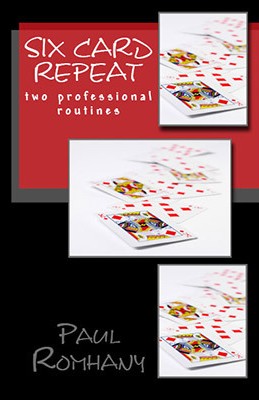Doug Dyment - MindSights
PDF
Featuring the following ...
“QuickerStack” (a.k.a. The Half-Hour Memorized Deck) is a full-deck stack for the entertainer who wants to do memorized deck work, but not make it a life’s work. This new approach yields a sequence that (unlike some currently available) can be safely displayed to an audience (for example, here are the first ten cards: 7S-5H-10C-KD-2H-9C-AS-QD-6C-3C). Nonetheless, the conversion from any card’s value to its corresponding position (and vice versa) is straightforward, completely consistent, and both learned and remembered quite easily. This is the fastest algorithmic solution yet devised, and significantly updated and improved from the original version described in the first six printings of Mindsights (for readers of earlier editions, and those who have a specific interest in this stack, it is also available as a separate publication). QuickerStack also incorporates a specialized ordering that enables the execution of a wide variety of strong effects, a more versatile approach than stacks designed around a fixed collection of the author’s favourite pieces, and one favoured by many top performers. Alan Ackerman, for example, considers this ordering to be “the strongest of all stacks.”
The ability to quickly produce a magic square for an audience-selected number is always impressive, and because of this has been featured, both as a close-up performance item and as a popular “opener”, by numerous entertainers. The problem with most such routines, however, is that (1) the squares are not as “magical” as they might be, (2) the mathematics are a struggle, (3) the construction method does not work well for large numbers, and/or (4) the technique does not bear repetition, as the resulting squares are too similar. The new approach explained here yields squares that add to the chosen number in more than two dozen different and interesting ways, can be produced in less than ten seconds with no more than a single (and simple) subtraction, works with numbers of almost any magnitude, and can be repeated nearly three dozen times for the same audience (even the same target number) with no apparent duplication, making it suitable for walk-around, trade shows, etc. Included—as an example of using numbers of different sizes—is a particularly practical (and equally simple) method for producing magic squares that add to a specific year.
“Major Arcanum” is an unusually clean Tarot card prediction. A normal pack of (Major Arcana) Tarot cards is shown to be well mixed, and placed on the table. A prediction is displayed. An audience member throws a regular die three times and totals the values (no force). Without the performer changing the order of any cards in the deck, the spectator counts to the value, and the arrived-at card is seen to match the (clearly worded) prediction! It’s that straightforward, with no duplicate (or otherwise special) cards, and no secret writing. Several additional performance options are described.
Bob Carver’s brilliant but little-known ESP demonstration, considered by many to be the best impromptu ESP symbol-matching routine ever, is revisited. Using nothing more than ten ungaffed ESP cards, this updating (“Bob’s Your Uncle”) offers a simple, mechanistic replacement for the difficult mental calculations that were necessary in the original version, making it an easily acquired addition to any performance repertoire.
You’ll also find a baffling high-audience-participation numeric prediction; an unfathomable “pick a card” routine that has bewildered magicians worldwide; an interesting billet idea for a multiple-out prediction; what may be the most astonishing optical illusion ever devised; and several essays on the performance of mentalism, by a past President of the Psychic Entertainers Association.








